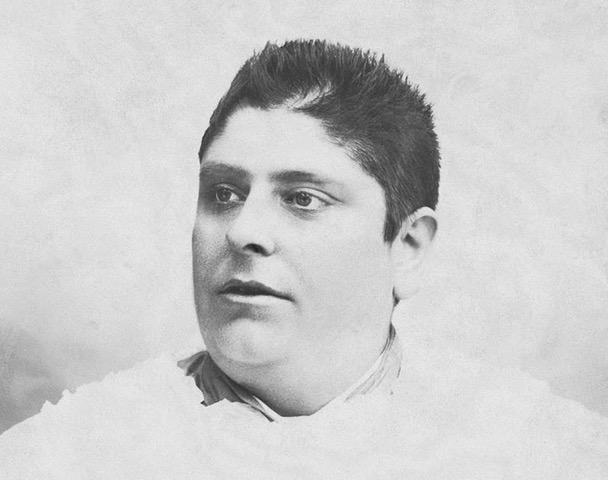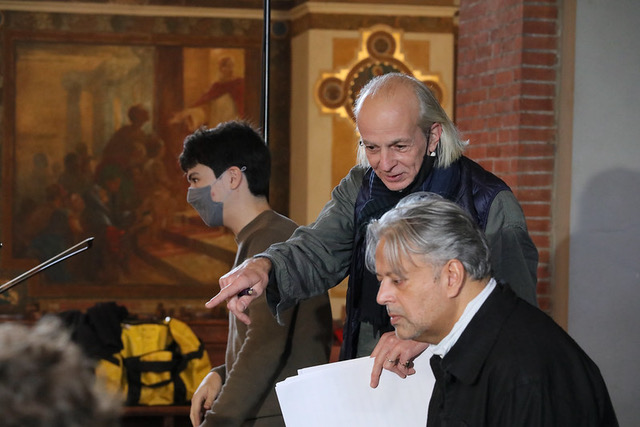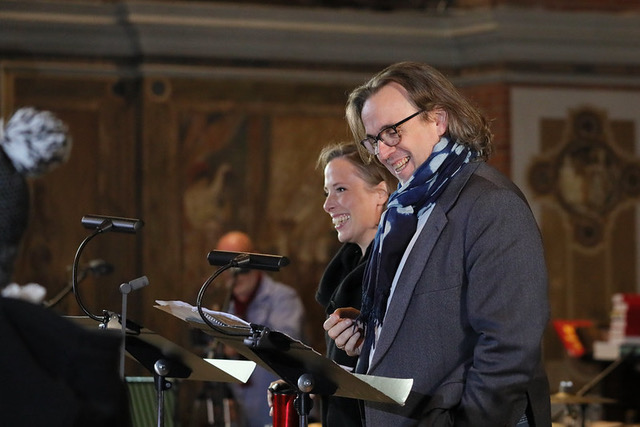 |
| Alessandro Moreschi (1858-1922) |
 |
| Max Hoehn and Torsten Rasch |
Max's idea for Opera21 came directly out of two libretti that he was writing, but the idea also sprang from the pandemic. His thoughts were "what was useful for opera now?". He was thinking about contemporary opera, and despite a plethora of good composers, there is still quite a low hit rate with new operas. In Max's view, the problem often stems from the libretto. But also, the commissioning process is rarely artist-led and ideas for operas frequently arise with the commissioners, the intendants rather than with the artists. The Last Castrato is not Opera21's only project, they are also planning a new piece which will be digital, more of a radio opera, by Joe Cutler.
Torsten has written a number of operas, and many of these came about because people came to him with ideas. He has been very happy with the subjects so far, but he admits that it would be very hard to say no if he was genuinely not inspired by the subject, so he finds Max's ideas exciting. By writing 18 minutes of the opera and recording it, they have effectively created a pilot version of the work; this is common in television but less so in new opera and Max loves the music Torsten has written. They came together in London last year to create the recordings, despite restrictions.
Alessandro Moreschi (1858-1922) was the last-ever castrato employed by the Pope in the Sistine Chapel Choir. In 1902 and 1904, Fred Gaisberg (1873-1951) of the Gramophone Company recorded Moreschi and the results are both haunting and tantalising, the only audio documentation that we have of the castrato voice [you can hear him on YouTube and you can still get the collected recordings originally released on Opal on Amazon]. The story appealed to Max because music is at its heart, though they do not try to imitate the castrato voice, instead, music naturally plays a role in the drama and enhances the storytelling.
 |
| Torsten Rasch & Gerry Cornelius at Opera21's recording session for Torsten Rasch's The Last Castrato |
Max had already started thinking about a possible opera when he learned further details of Moreschi's life, what Max calls the strange love story whereby Moreschi got married and though the marriage fell apart when his former wife had a child by another man, Moreschi would adopt the child (who as an adult went on to act and appeared in an early Fellini film!). So there is this love story and the weight of past trauma in Moreschi's life with his castration at a young age, all taking place in the shadow of the Roman Catholic Church, resulting in lots of different textures. Max's libretto aims to tell the story without using too much text. He describes it as a jigsaw puzzle with a need to leave space for the music so that the libretto is simply a scaffolding for the composer to build on.
Torsten knew Moreschi's recordings but knew nothing about the man himself. Torsten describes Moreschi as an archetypical hero in a drama, he is very torn but is not a tragic figure as he does not reject what he is. The most difficult point was the find the real essence of the drama. Max's libretto is centred around the time that Moreschi made the recordings in 1902, with moments in the past and moments in the future. Because we cannot have a castrato voice nowadays, there is no reflection of this voice type in the music, Torsten had no wish to try and imitate the voice. In the opera, when Moreschi is singing, the singer (Andrew Watts) speaks, and the only time we hear the castrato singing is when the 1902 recording plays. Torsten knew Andrew Watts before making the recording last year, as Andrew had already appeared in one of Torsten's operas.
Moreschi had a very particular speaking voice too, in one of the recordings (probably an out-take) Moreschi can be heard laughing in the background and it is a strange, childish laugh. They gave a lot of thought to the voice type needed for the role, a baritone or tenor would not fit and they wondered about a woman. And though counter-tenors are relatively common nowadays, for audience members who are not regular concert-goers, the voice type is still somewhat exotic.
 |
| Andrew Watts at Opera21's recording session for Torsten Rasch's The Last Castrato |
The other major character is Moreschi's wife, Guendalina. She is a somewhat ambiguous character, a young woman when she marries Moreschi, she runs off with his money and has a child with another man, a croupier. At first, she seems superficial, but she is not and Max sees her as genuinely attracted to and fascinated by Moreschi. Whilst the existing recordings sound strange to our ears (partly because of the voice type, partly because of the poor recording quality, and partly because Moreschi's singing style is a long way from that practised by modern singers so he approaches a note from anywhere up to an octave below), Moreschi was clearly admired in his day and known as the Angel of Rome. Max liked the idea of this relationship between the two, one that should not work, and a marriage that went against everything the Roman Catholic Church stood for - a man who could not have children deliberately getting married. These factors made both Moreschi and Guendalina more interesting. In the opera, Guendalina is a high soprano and on the recording, she is sung by Rebecca Bottone.
There is also a significant role for an accordion, an instrument that Torsten has used before and whose use he admired in Elena Langer's opera, Figaro gets a divorce.
Whilst Torsten feels that people will recognise his style in the music, every opera is a different story so his approach is different each time. He remains himself but finds a new way of expressing himself. And whilst he is in the musical world that he has created for the last 30 years, he also stretches himself a bit.
 |
| Rebecca Bottone & Andrew Watts at Opera21's recording session for Torsten Rasch's The Last Castrato |
The opera is deliberately a chamber piece, that is the type of work they discussed when Max first showed Torsten the libretto. Max talks about the way Britten made an art form out of the small-scale operatic form. But Torsten composes for a bit canvas and the story has an epic quality to it, so just as with Britten's smaller-scale operas, there is the potential for staging in medium to larger theatres as well. Max is fond of the idea of chamber-sized epic shows, and refers to The Lehman Trilogy (the play by Stefano Massini, adapted in London by Ben Power) where three actors bring a huge story to life. Max tends to like ambition in the storytelling of dramatic pieces.
Having released the recording last year, Max hopes that the Opera21 digital platform can be used to draw interest from opera companies. He wants Opera21 to be a platform to find collaborators so that opera companies will commission ambitiously rather than pragmatically. Opera houses used to take up to five years for major commissions, but in a post-pandemic world Max wonders how things will react, will creating new opera have to be faster, to react quicker, and we joked about whether Torsten would be able to match Rossini and complete The Last Castrato in three weeks. What is certain, is that there is a need to create stories that relate to now.
Never miss out on future posts by following us
The blog is free, but I'd be delighted if you were to show your appreciation by buying me a coffee.
Elsewhere on this blog
- Manhattan to Montmartre: Bernstein and Gershwin transcriptions from Julian Jacobson and Mariko Brown - record review
- The cycle of life: Jamie Manton's new production of Janacek's The Cunning Little Vixen at English National Opera - opera review
- Phantasm completes its survey of all John Jenkins's viol consorts with a disc of his four-part consorts on Linn - record review
- Early Moderns: the (very) first Viennese School from American Baroque ensemble Quicksilver - record review
- Most pieces use the dichotomy between tonality and atonality: I chat to composer Eleanor Alberga about writing music - interview
- Certainly not traditional, but true to the work's spirit and dramaturgy: Edward Dick's production of Bizet's Carmen returns to Opera North with Chrystal E Williams back in the title role - opera review
- Mendelssohn and Schumann from Antonello Manacorda and the Orchestra of the Age of Enlightenment - concert review
- Snapshots of a Romance: Elizabeth Llewellyn and Simon Lepper at Classical Vauxhall - concert review
- Vividly theatrical: Irish National Opera's production of Vivaldi's Bajazet at Covent Garden - opera review
- Devastates & dazzles: Jakub Józef Orlinski, Il Pomo d'Oro & Francesco Corti in rare 18th century arias at Wigmore Hall - concert review
- György Cziffra: Pianist János Balázs on celebrating the great Hungarian's centenary & continuing his artistic legacy - interview
- Mélodies: French song and Czech rarities from two young Czech singers - record review
- Home











No comments:
Post a Comment